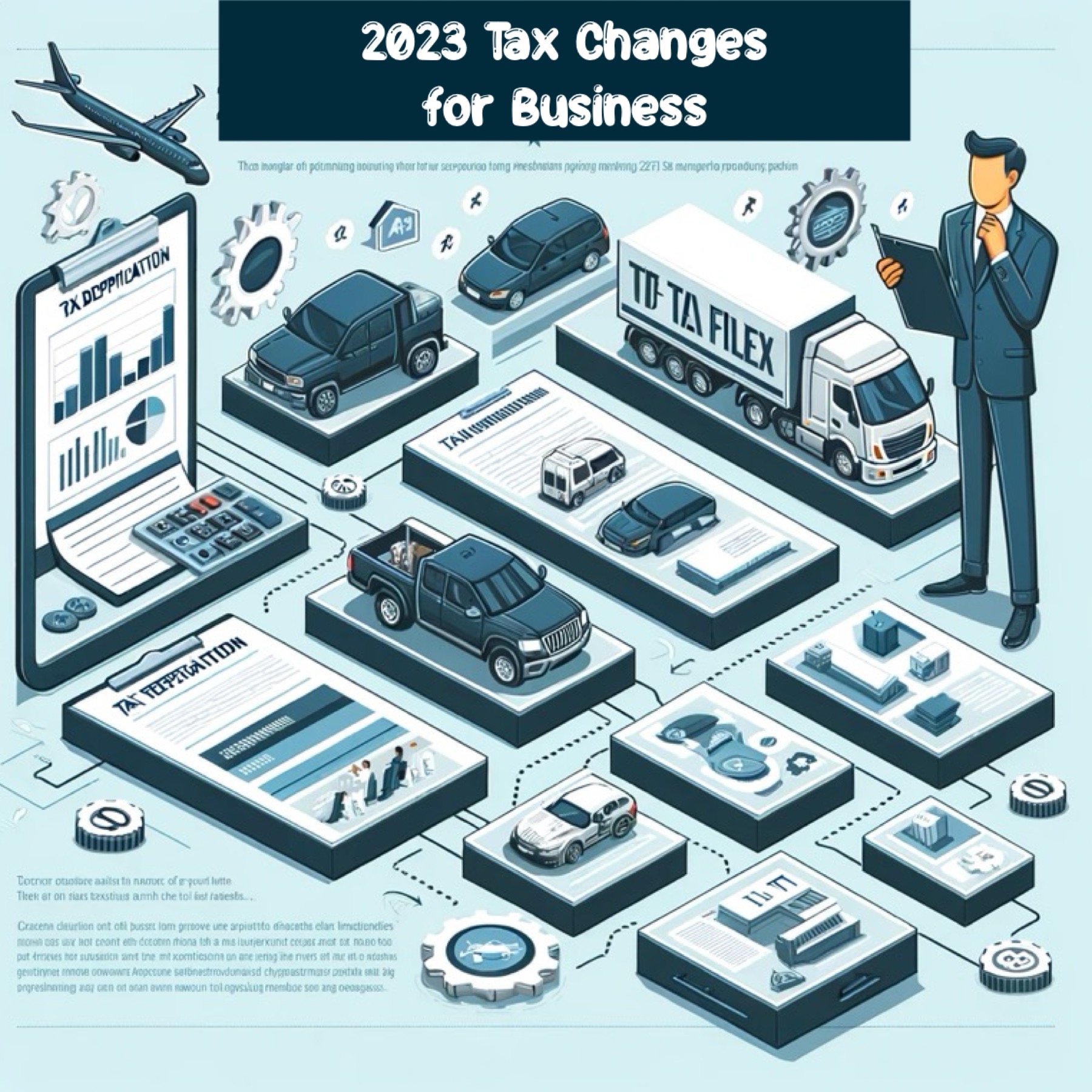- Understanding the 2023 Tax Changes for Your Business
As we step into a new tax year, it’s crucial for business owners to stay informed about the latest tax changes and adjustments. The 2023 tax year brings several significant updates, largely influenced by recent legislative acts such as the SECURE 2.0 Act, Inflation Reduction Act (IRA), and the CHIPS Act. Let’s delve into what these changes mean for your business.
2023 Updates on Tax Depreciation
The 2023 tax year brings several updates in the area of tax depreciation, which are crucial for businesses to understand for effective asset management and tax planning:
1. Section 179 Deduction: The maximum Section 179 expense deduction for tax year 2023 is expected to be increased to account for inflation. This deduction allows businesses to deduct the full purchase price of qualifying equipment and/or software purchased or financed during the tax year.
2. Bonus Depreciation: The bonus depreciation percentage for qualified property has decreased. For property placed in service after December 31, 2022, and before January 1, 2024, the bonus depreciation percentage is now 80%. This gradual phase-down is part of the changes introduced by the Tax Cuts and Jobs Act.
3. Qualified Improvement Property (QIP): Businesses should continue to take advantage of the 15-year depreciation for QIP, which includes improvements made to the interior portion of a non-residential building.
4. Luxury Auto Depreciation Limits: The depreciation limits for passenger vehicles placed in service in 2023 are adjusted for inflation. Businesses using these vehicles should be aware of the revised limits for both bonus and regular depreciation.
Changes to Qualified Business Income (QBI) Deduction
The QBI deduction, also known as the Section 199A deduction, has seen some updates for 2023:
1. Income Thresholds: The income thresholds for the QBI deduction are adjusted for inflation. These thresholds determine eligibility for the full deduction, as well as the phase-in of specified service trade or business (SSTB) limitations and wage and property limitations.
2. SSTB Limitations: For taxpayers above the income threshold, the deduction for income from SSTBs begins to phase out. Understanding how this phase-out operates is crucial for service-oriented businesses.
3. REIT and PTP Income: Taxpayers can continue to claim the QBI deduction for their qualified real estate investment trust (REIT) dividends and publicly traded partnership (PTP) income, which is not subject to the wage and property limitations.
4. Complex Calculations for Certain Businesses: Businesses with multiple activities or those that fall into the SSTB category may face more complex calculations to determine their eligible QBI deduction.
It’s important for businesses to consider these changes in tax depreciation and QBI rules while doing their tax planning for 2023. These updates could significantly impact the tax liabilities and strategies of businesses, especially those making substantial capital investments or operating in service industries.
Inflation Adjustments: Impact on Tax Rates and Brackets
In response to rising inflation, the IRS has made larger-than-usual adjustments to tax rates and brackets. This means that the income thresholds for various tax brackets have increased, potentially lowering the tax burden for many businesses. Understanding where your business falls within these updated brackets is essential for accurate tax planning and filing.
Embracing Sustainability: Credits under IRA and CHIPS Act
One of the most impactful changes comes from the Inflation Reduction Act and the CHIPS Act, focusing on sustainability and technological advancements. These acts introduce new credits and incentives for businesses investing in clean energy and advanced manufacturing.
Clean Energy Initiatives
The IRA provides numerous opportunities for businesses involved in clean energy projects. Significant credits include incentives for renewable energy production, carbon capture, and clean hydrogen production. These credits not only support sustainable business practices but also offer financial benefits.
Advanced Manufacturing Boost
The CHIPS Act, on the other hand, aims to bolster the semiconductor industry and related advanced manufacturing sectors. Businesses in these fields can take advantage of the new investment tax credits, aiding in modernizing operations and staying competitive in a rapidly evolving technological landscape.
Other Key Tax Considerations
Beyond these major acts, businesses should also pay attention to changes in other areas:
-Deductions and Fringe Benefits: Review any alterations in tax deductions, especially those related to business expenses, fringe benefits, and health-related accounts.
– Medical Spending Accounts: Changes in contribution limits to Health Savings Accounts (HSAs) and Flexible Spending Arrangements (FSAs) could affect your business’s healthcare budgeting.
-Long-Term Care Premiums: Adjustments in the deductibility of long-term care insurance premiums need to be considered, especially for businesses providing these benefits to employees.
In conclusion, the 2023 tax year presents a mix of challenges and opportunities for businesses. Staying abreast of these changes is key to maximizing your benefits and ensuring compliance. As always, it’s advisable to consult with us to navigate these updates effectively and tailor them to your specific business needs. Make a tax planning appointment today: afsg.as.me/bookings




